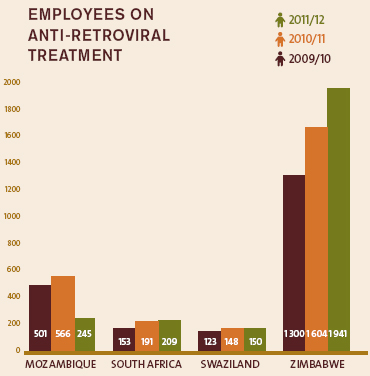HEALTH
Tongaat Hulett continues to provide comprehensive health care programmes that include occupational health, primary health and general wellness. In addition to maintaining funding for various health related programmes, a significant spend was devoted to maintaining hospital and clinic facilities owned by Tongaat Hulett in the six countries that it operates.
HIV AND AIDS
HIV and AIDS still remains the single biggest health challenge. There has been a steady increase of employees undertaking HIV Counseling and Testing (HCT)/Voluntary Counseling and Testing (VCT) during the last three years where 79,3 percent of employees presented in 2009/10, 79,6 percent in 2010/11 and 80,4 percent in 2011/12.
Tongaat Hulett’s overall employee HIV prevalence was 19,4 percent as at 31 March 2012 which was an improvement from a prevalence of 21,0 percent at the same time in the previous year. A total of 2 545 employees are currently receiving Anti-Retroviral Treatment (ART) through the company’s ART programme which is an increase compared to 2 509 employees enrolled at the same time in 2011. The total cost of the ART programme was R1 901 579 during the fiscal year compared to
R1 673 726 spent in 2010/11.
While all operations now have VCT and ART being offered in one way or another, Tongaat Hulett plans to introduce a HIV/AIDS management standard based on international best practices. The South Africa National Standard for HIV & AIDS workplace programmes (SANS 16001) is one such system being considered. Furthermore, Tongaat Hulett will encourage male circumcision to all operations. Male circumcision is a strategy which is being employed to reduce the transmission of HIV in men. It is 60 percent effective in reducing transmission of HIV and when combined with other HIV preventive measures, results in much lower transmission levels.

OCCUPATIONAL HEALTH
There were 24 minor occupational health incidents for the year (23 cases of tenosynovitis of the wrist in cane cutters and 1 case of backache from a cane haulage driver). Control measures to prevent tenosynovitis in the form of training, provision of correct tools, treatment and rehabilitation are in place and on-going.
Occupational health programmes that include risk based medical surveillance programmes are well entrenched within the framework of management systems aligned to NOSA and OSHAS 18001.
MALARIA
In Mozambique, Zimbabwe and Swaziland where malaria remains a significant health risk, the operations continue to implement integrated malaria control programmes that include vector control, awareness, personal protection, diagnosis and treatment.
Sadly, 4 employees died of malaria during the course of the year. They were cases of severe malaria that were contracted outside of Tongaat Hulett’s Estates. A total of 967 cases of malaria were attended to at the company’s health facilities representing a 21% increase from cases recorded in the previous year.




